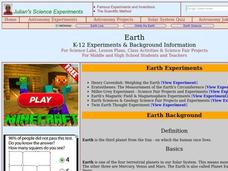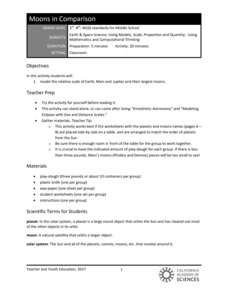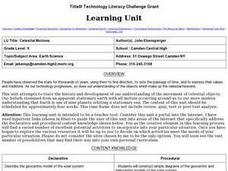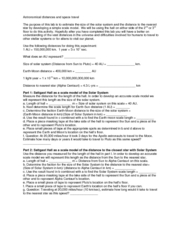Curated OER
The Starry Night Time and Day Time
Second graders complete a unit of lessons on the solar system. They complete various art projects inspired by Van Gogh's 'Starry Night,' create a moon phases book, create a moon phase wind chime, develop a timeline of space exploration,...
Curated OER
Astronomy
Students complete a unit of lessons on our solar system, its stars, and astronomers. They record information in a space journal, design constellations, define key vocabulary, observe the phases of the moon, and create a group planet...
Curated OER
Scavenger Hunt: Who am I?
In this space science worksheet, students use the sites listed on the Solar System and Planets page of the Kid Zone to locate the names of the people credited with each discovery. They identify and name 26 different scientists who made...
Curated OER
Planetary Weather
Middle schoolers study the weather on other planets in our solar system. In this planetary weather instructional activity students create a display of the different weather conditions on the other planets.
Curated OER
Earth
Students study the earth in relation to the solar system. In this planetary lesson students complete several investigations into the measurement of the earth and its magnetic field.
Curated OER
Quiz: Astronomy
In this science worksheet, 3rd graders will focus on various aspects of astronomy. Students will respond to ten questions all pertaining to stars, constellations, planets, and our solar system.
Curated OER
Exploring the Planets
Students study robotic spacecrafts that have provided detailed information about the inner and outer planets. In this exploring the planets lesson plan, students use posters and diagrams to study the various robotic spacecraft sent to...
California Academy of Science
Moons in Comparison
Just how big is Earth's moon? With a hands-on simulation, scholars use Play-Doh to model the sizes of the planets Earth, Mars, Jupiter, and their moons. They make predictions as a class, work together to make their models, and discuss...
Curated OER
The Solar System
In this crossword puzzle worksheet, students read the 20 clues about the solar system. Students then complete the puzzle with 20 words related to the solar system.
Curated OER
Let's Build a City In the Solar System
Sixth graders explore the solar system. Using the Internet, 6th graders gather information about planets in our solar system. Students participate in an activity to determine where they should build the first city in space. They create a...
Curated OER
The Solar System
For this solar system worksheet, students use a word bank of planet names to answer questions about planets. A reference website for additional resources is given.
Curated OER
Solar System
Students create and present PowerPoint presentations on certain aspects of our Solar System. The Nettrekker search engine is used for researching the information. Students can then add music and graphics to enhance their presentations.
Curated OER
Extraterrestrials Visit Earth
Students compare the unique characteristics of Earth to other planets and then write descriptions of Earth that might attract fictional extraterrestrials to visit the planet. They design an appealing travel brochure that incorporates the...
Curated OER
Planets or Not, Here We Come!
Students, working in groups, research planets in terms of the size, temperature, number of moons, and potential for life. They use packets and worksheets as guides for their research. Students may role-play as aliens visiting their...
Curated OER
Celestial Motions
Ninth graders complete a unit of lessons on the history of our knowledge of celestial objects. They conduct Internet research, plot the motion of a planet, construct a model of the sun's apparent motions, and create diagrams of the solar...
Curated OER
Solar System Fun Facts
Students read facts about the Solar System. In this solar system lesson plan, students read facts on the dimensions, planets, and workings of the solar system. There is a big emphasis on Saturn.
NASA
Dark Matter NASA Conference
Young scholars calculate the escape velocity of planets in our solar system and use that knowledge to calculate the escape velocity for NGC 2300 group. They then suggest reasons for the escape velocity to be higher than possible given...
University of Colorado
Modeling Sizes of Planets
The density of the huge planet of Saturn is 0.7 g/cm3, which means it could float in water! In the second part of 22, science pupils explore the size and order of the planets. They then calculate weight and/or gravity and density of...
Star Date
Modeling the Night Sky
Dramatize the stars and planets as they become a visual representation of the solar system in this activity. Young astronomers track and simulate various constellations as they orbit the Earth to learn the position and motion of...
American Museum of Natural History
Beyond Planet Earth
Scholars take a journey through space with 16 eye-catching images. Along the way, learners read captions starting with the moon, then move onto asteroids, Mars, and Jupiter.
Curated OER
Uranus, Neptune, and Pluto
In this planets worksheet, students read information about Uranus, Neptune, and Pluto and then complete 18 multiple choice, 4 true or false, and 2 fill in the blank questions.
Howard Hughes Medical Institute
Distribution of Elements in Earth’s Crust
How do scientists know the difference between a meteorite from space and a regular rock from the earth? Scholars read a passage and answer comprehension questions about the creation of the solar system. They extrapolate the main ideas to...
Curated OER
The Earth and Beyond
In this solar system worksheet, students complete 2 activities that involve ordering the nine planets and correctly placing them onto a diagram.
Curated OER
Astronomical Distances and Space Travel
Students estimate the size of the solar system and the distance to the nearest star. In this space lesson plan students complete calculations and use Sattgast Hall as a scale model.
Other popular searches
- Solar System Inner Planets
- Solar System Planets
- Solar System and Planets
- Science Planets Solar System

























